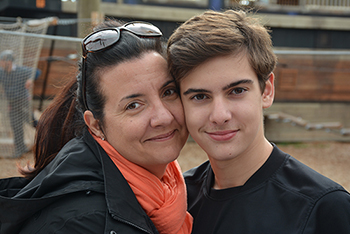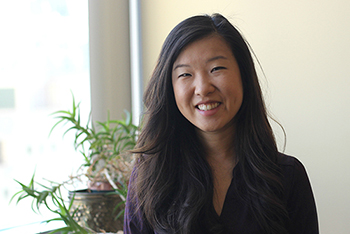Zero gluten, only way to treat celiac disease
Julie Boisvenue found out she had celiac disease – an inflammation of the small bowel caused by a reaction to gluten – in circumstances that were far from ordinary. The mother of a 14-year-old son and an 11-year-old daughter was in her kitchen one evening, when she fainted and hit her head. She was taken to St. Mary’s Hospital with the suspicion of a concussion. After tests, however, doctors diagnosed heart arrhythmia, but couldn’t explain why.

Julie spent two days at St-Mary’s and was then transferred to the Cardiac Care Unit of the Montreal General Hospital of the McGill University Health Centre (MGH-MUHC), where she had a temporary pacemaker implanted.
Julie Boisvenue found out she had celiac disease – an inflammation of the small bowel caused by a reaction to gluten – in circumstances that were far from ordinary. The mother of a 14-year-old son and an 11-year-old daughter was in her kitchen one evening, when she fainted and hit her head. She was taken to St. Mary’s Hospital with the suspicion of a concussion. After tests, however, doctors diagnosed heart arrhythmia, but couldn’t explain why. Julie spent two days at St-Mary’s and was then transferred to the Cardiac Care Unit of the Montreal General Hospital of the McGill University Health Centre (MGH-MUHC), where she had a temporary pacemaker implanted.
“At the MGH, they were still trying to figure out the cause of my heart problem and a few weeks later decided I should get a permanent pacemaker. At that point, one of the residents told me about a study linking heart arrhythmia and celiac disease. I later underwent an endoscopy which confirmed I had celiac disease. I was really scared: on top of my cardiac issues and a digestive disorder, I was afraid my children could have celiac disease as well.”
Only one treatment
Celiac disease is a fairly common genetic autoimmune disorder, touching about one percent of the population. People with a family history are more at risk of developing the disease at some point in their lives.
Symptoms include abdominal bloating, pain, gas, diarrhea and weight loss, but some people, like Julie, have no symptoms at all.

“When undiagnosed or untreated, celiac disease damages the small bowel and can lead to complications like vitamin and iron deficiency, osteoporosis, neuropathies and, in some rare cases, cancer,” says MUHC Gastroenterologist Dr. Yidan Lu. “Although heart disease is not generally associated with celiac disease, a few studies have suggested a possible link between the two. The only treatment for this condition is a diet strictly free of gluten – a protein found in wheat, rye and barley – for life. Before changing eating habits however, it’s important to be tested to avoid false negative results.”
Big lifestyle changes for the family
Soon after Julie’s diagnosis, her son Justin Grenon found out he, too, had celiac disease.
“I was disappointed and scared that my whole life was going to change because I wouldn’t be able to eat what I usually ate,” says Justin, who is an athlete and plays hockey and football.
Although Julie was familiar with the restrictions of a gluten-free diet – her stepfather happens to have celiac disease – she was not prepared to face the radical lifestyle changes that celiac disease demands.
“I had a general idea of what to avoid, but to be standing in the grocery store, trying to figure out what the labels meant and what to choose was frustrating,” she says. “Removing something from your daily diet may sound simple, but when it’s forced upon you, there’s definitely a grieving period while you adapt to it.”
At the MUHC, Julie and Justin had the support of Gastroenterologists Dr. Alan Barkun and Dr. Najma Ahmed, and Nutritionists Karen Casey and Carolyne Brien.
“There’s a growing awareness about gluten intolerance these days and plenty of information about a how to follow a gluten-free diet and where to find gluten-free products,” says Carolyne, who has celiac disease herself. “However, it’s important to realize gluten is hidden in a lot of products like makeup, shampoos, cleaning products and medications.”
“Adhering to a gluten-free diet is expensive,” adds Dr. Lu. “Nutritionists and dieticians will show patients options that don’t necessarily involve buying prepared gluten-free products.”
A lifetime commitment
A year into the restrictive diet, the Boisvenue-Grenon family is taking it all in stride.
“We have two toasters and two sets of cooking utensils,” Julie says. “Some meals like gluten-free pasta are shared by all in the family, but on pizza night, I use two different types of dough. We also know what to do when eating out or at a friend’s place. Lunch at school is still a challenge for Justin though: healthy gluten-free food options are few and far between at the cafeteria.”
Although he had to give up many things he loves such as muffins, cakes and cookies, Justin says he has been “pretty responsible”.
“It’s not that hard. At school, my friends understand when I say I can’t have something. There’s even gluten-free stuff that I like better than regular food, like English muffins. Honestly, there are a lot of worse things out there. If this is what I have to go through in my life, then I can say I’m a lucky person.”